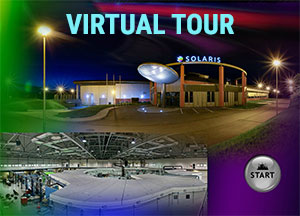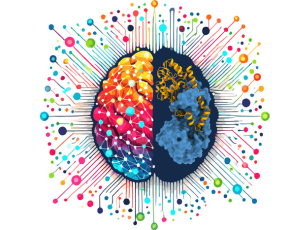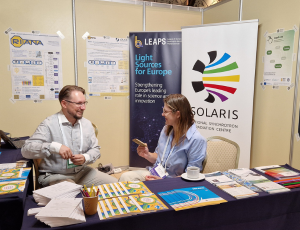 Web Content Display
Web Content Display
SOLARIS centre
 Web Content Display
Web Content Display
Project of a new research beamline at SOLARIS as the culmination of cooperation between three countries
As a center integrating three international scientific communities, SOLARIS stands on the brink of inaugurating a project aimed at constructing a unique research beamline. The exceptional nature of this endeavor lies in the combined efforts of Poland, Ukraine, and Switzerland to finance an experimental beamline that will benefit researchers from a war-torn country and consolidate the scientific community in the Central and Eastern European region. This initiative is coordinated under the auspices of the League of European Accelerator-based Photon Sources (LEAPS), which includes all European synchrotron centers.
Since 2022, the project has involved SOLARIS Center and the Ukrainian Synchrotron Radiation Users Society organizing a series of workshops attended by over 500 scientists. These meetings identified the needs and research priorities of the Ukrainian scientific community and developed detailed plans for the construction of the new research beamline.
The beamline, which will consolidate the Ukrainian scientific community and researchers in the Central and Eastern European region, will be located at the SOLARIS synchrotron in Krakow. It is being initially planned by Polish and Ukrainian scientists. Simultaneously, efforts are ongoing to expand cooperation to include scientists from other countries in the region. The project would not have been possible without the significant support of the Paul Scherrer Institute (Switzerland) and Professor Luc Patthey. Professor Patthey spent three months at the SOLARIS Center, developing a feasibility study and the method for delivering the undulator as the source for the new research beamline, which was an in-kind donation from the Institute valued at 1 million CHF.
Additional funds for the beamline construction, amounting to 1.5 million CHF, come from the Swiss National Science Foundation and the State Secretariat for Education, Research and Innovation of the Swiss federal government, which decided to contribute in May of this year. These significant financial resources represent a milestone in the trilateral cooperation between Switzerland, Poland, and Ukraine. Swiss support is crucial but will only cover part of the project. Additional funds are needed for the complete construction of the research beamline. SOLARIS Center is actively seeking additional funds through European Union projects, LEAPS centers, and discussions with representatives from our region of Europe.
The initiated cooperation between the three countries will facilitate the exchange of knowledge and experience, contributing to the development of new technologies and research methods. Additionally, sharing infrastructure costs and access to advanced equipment will increase research efficiency and shorten the time needed to obtain results. The project will also stimulate the exchange of scientists, building a strong European research community and promoting the scientific capabilities and potential of individual regions.
The new research beamline will operate in the regime of moderate and hard X-rays, offering unparalleled capabilities for observing and analyzing material properties. This advancement is expected to drive innovations in several key industrial areas. The designed beamline will be a catalyst for research and development in industries crucial to individual countries and the broader Central and Eastern European region, such as agriculture, energy, metallurgy, automotive, and biotechnology. Until now, no comparable infrastructure in the Central and Eastern European region has allowed such a comprehensive range of studies using state-of-the-art methods. The techniques offered on the beamline will enable, among other things:
• Improvement of food quality and safety through trace element analysis in edible products to detect contaminants and additives,
• Assistance in developing more environmentally friendly agricultural practices by studying soil and understanding plant growth processes, nutrient transport, and CO2 absorption,
• Analysis of catalysts used in energy production, promoting the creation of more efficient and environmentally friendly catalytic processes,
• Support for initiatives in drug delivery systems, biocompatible materials, and disease research.
The trilateral cooperation between Switzerland, Poland, and Ukraine aims to enhance the potential of the Central and Eastern European region by providing advanced research capabilities aligned with the strategic goals of the European Union. This innovative infrastructure will contribute to progress in critical areas such as agriculture, energy, metallurgy, automotive, and biotechnology, supporting a competitive and sustainable future for the region.
SOLARIS Center remains open to international collaboration and continually seeks new partners, particularly focusing its efforts on Baltic and Transcarpathian countries. Expanding cooperation to these regions is a key element of SOLARIS' strategy to strengthen the network of international scientific partnerships and further develop research infrastructure.
Published date 02/07/2024
- Dagmara Chylewska-Olech
Recommended



